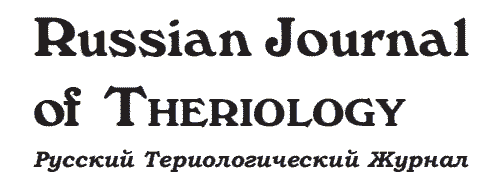Maternal care in captive grey hamster Cricetulus migratorius (Rodentia, Cricetidae)
Gromov V.G., Surov A.V., Ryurikov G.B.
P. 73-77
In ten female grey hamsters, Cricetulus migratorius, rearing their first litters, both direct and indirect maternal activities were studied under laboratory conditions during the observation period (21 days from parturition) divided into four rearing stages: days 2–6, 7–11, 12–16, and 17–21, respectively. The maternal care was found to include nursing, huddling over, brooding and grooming the young, the nest construction and food caching. Total time spent in the nest by the females was found to decrease gradually during the whole observation period as well as other maternal activities with exception of pup grooming that has maximum rate during second rearing stage. Maternal behaviour of Cricetulus migratorius is discussed in comparison with that one of other cricetid rodents.
DOI: 10.15298/rusjtheriol.5.2.04References- Altmann J. 1974. Observational study of behavior: sampling method // Behaviour. Vol.49. No.3. P.227-267.
- Bashenina N.V. 1951. [Ecology of the grey hamster (Cricetulus migratorius Pall.) inhabiting the European part of the USSR] // Fauna and Ecology of Rodents. Vyp.4. P.157-183 [in Russian].
- Buntin J.D., Jaffe S. & Lisk R.D. 1984. Changes in responsiveness to newborn pups in pregnant, nulliparous golden hamsters // Physiology and Behavior. Vol.32. No.3. P.437-439.
- Daly M. 1972. The maternal behaviour cycle in golden hamsters (Mesocricetus auratus) // Zeitschrift für Tierpsychologie. Bd.31. Hf.3. P. 289-299.
- Getz L.L. 1972. Social structure and aggressive behavior in a population of M. pennsylvanicus // Journal of Mammalogy. Vol.53. No.2. P.310-317.
- Getz L.L. & Carter C.S. 1980. Social organization in Microtus ochrogaster populations // The Biologist. Vol.62. P.56-69.
- Gromov V.S. 2003. [Territorial structure and social organization in Brandt vole (Lasiopodomys brandti) under semi-natural conditions] // Zoologicheskii Zhurnal. Vol.82. No.7. P.852-861 [in Russian with English summary].
- Gromov V.S. 2005. Parental care in captive Brandt vole (Lasiopodomys brandti) // Russian Journal of Theriology. Vol.4. No.2. P.137-145.
- Kleiman D.G. 1977. Monogamy in mammals // Quarterly Review of Biology. Vol.52. P.39-69.
- Lonstein J.S. & De Vries G.J. 1999. Comparison of the parental behaviour of pair-bonded female and male prairie voles (Microtus ochrogaster) // Physiology and Behavior. Vol.66. No.1. P.33-40.
- Noirot E. & Richards M.P.M. 1966. Maternal behaviour in virgin female golden hamsters: changes consequent upon initial contact with pups // Animal Behaviour. Vol.14. No.1. P.7-10.
- McGuire B. & Novak M. 1984. A comparison of maternal behaviour in the meadow vole (Mictotus pennsylvanicus), prairie vole (M. ochrogaster) and pine vole (M. pinetorum) // Animal Behaviour. Vol.32. P.1132-1141.
- Richards M.P.M. 1966. Maternal behaviour in virgin golden hamsters (Mesocricetus auratus Waterhouse): the role of the age of the test pup // Animal Behaviour. Vol.14. No.3. P.303-309.
- Rowell T.E. 1960. On the retrieving of young and other behaviour in lactating Golden hamsters // Proceedings of the Zoological Society of London. Vol.135. P.265-282.
- Rowell T.E. 1961. Maternal behaviour in non-maternal golden hamsters // Animal Behaviour. Vol.9. No.1. P.11-15.
- Smorkatcheva A.V. 1999. The social organization of the mandarin vole, Lasiopodomys mandarinus, during the reproductive period // Zeitschrift für Säugetierkunde. Bd.64. Hf.6. P.344-355.
- Smorkatcheva A.V. 2003. Parental care in the captive mandarin vole, Lasiopodomys mandarinus // Canadian Journal of Zoology. Vol.81. No.8. P.1339-1345.
- Stern J.M. & Johnson S.K. 1990. Ventral somatosensory determinants of nursing behavior in Norway rats: I. Effects of variations in the quality and quantity of pup stimuli. Physiology and Behavior. Vol.47. No.5. P.993-1011.
- Vasilieva N.Yu. & Surov A.V. 1984. [Spatial population structure and behaviour of the grey hamster in the Transaltai Gobi Desert, Mongolian People Republic] // Sokolov V.E. (ed.). [Communication and Ecology of Mammals and Birds]. Moskva: Nauka. P.113-120 [in Russian].
- Wynne-Edwards K.E. 1987. Evidence for obligate monogamy in the Djungarian hamster, Phodopus campbelli: Pup survival under different parenting conditions // Behavioural Ecology and Sociobiology. Vol.20. No.6. P.427-437.
- Wynne-Edwards K.E. 1995. Biparental care in Djungarian but not Siberian dwarf hamsters (Phodopus) // Animal Behaviour. Vol.50. P.1571-1585.
- Wynne-Edwards K.E. 1998. Evolution of parental care in Phodopus: conflict between adaptations for survival and adaptations for rapid reproduction // American Zoologist. Vol.38. No.1. P.238-250.
Download PDF
|

